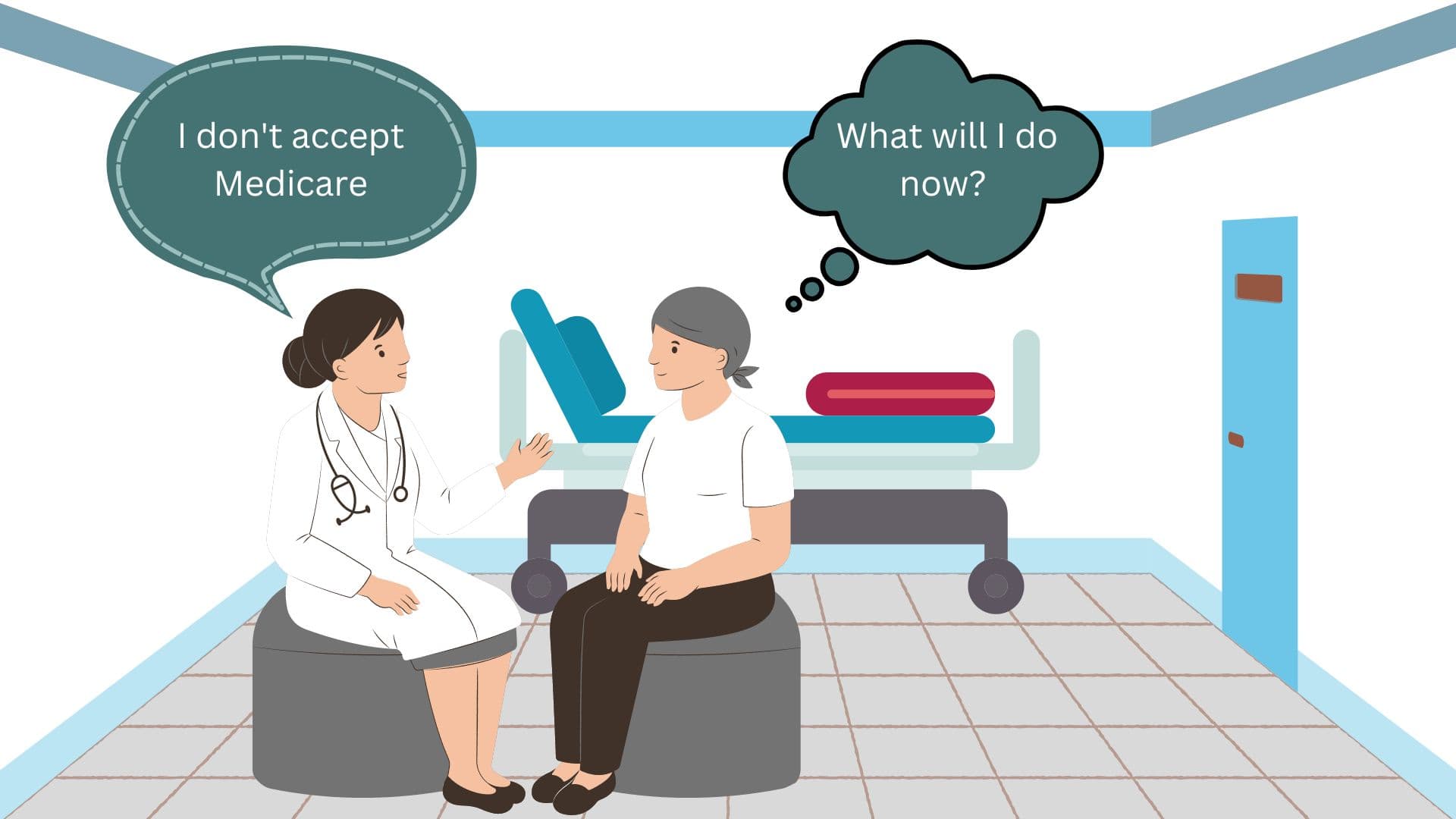If you want to make an appeal or lodge a complaint, talk to your MBO
Fair Square
, but it is an ongoing process.Stay Up to Date on Medicare!
What is a Medicare Ombudsman?
CMS
) who ensures that Medicare beneficiaries receive fair treatment within their Medicare rights. Think of them as a neutral party within the CMS that acts as an advocate for you if you feel as though you’ve been mistreated.- Helping Medicare beneficiaries navigate the system and respond to issues related to coverage, claims, and billing
- Providing information about your Medicare benefits, rights, and protections
- Helping beneficiaries file complaints and appeals related to their Medicare services and coverage
- Educating Medicare beneficiaries about fraud and abuse in Medicare, including strategies about how to protect yourself
Medicare
and propose strategies and recommendations to fix them.Why would I need to contact a Medicare Ombudsman?
- You are having difficulty accessing the healthcare services or treatments you need.
- You are experiencing delays or denials in getting Medicare coverage for a particular service or treatment.
- You are dissatisfied with the quality of care you are receiving from a healthcare provider or facility.
- You have concerns about the accuracy of your Medicare claims or bills.
- You are having difficulty navigating the Medicare system and need assistance with enrollment or understanding your benefits.
- Denials of coverage for medically necessary services or treatments
- Delays or denials in receiving prescription drugs or durable medical equipment
- Billing errors or disputes
- Quality of care issues, such as hospital infections or medical errors
- Issues related to Medicare Advantage or prescription drug plans
- Complaints about Medicare marketing or enrollment practices
- Difficulty navigating the Medicare system or understanding your benefits
How to contact a Medicare Ombudsman
this website.
CMS website
also has a page dedicated to resources regarding how to contact a Medicare Beneficiary Ombudsman.What to expect when contacting a Medicare Ombudsman
Tips for preparing to contact Medicare Ombudsman
- Gather information: Before contacting the Medicare Ombudsman, gather relevant information about your issue, such as medical bills or correspondence from your healthcare providers. Having this information on hand can help the Ombudsman better understand your situation and advocate on your behalf.
- Be proactive: The Medicare Ombudsman is there to assist you, but it's important to be proactive in your approach. No one will be a better advocate for you than yourself. If you have questions or concerns about the process or timeline, ask for clarification. If you think there may be additional information that could be helpful, offer to provide it. Being proactive can help ensure that your issue or complaint is resolved as quickly and efficiently as possible.
- Take notes: Keep a record of all correspondence and interactions with the Medicare Ombudsman, including dates, times, and the names of the people you speak with. This can help you keep track of the progress of your case and provide a reference in case you need to follow up.
- Follow up: After your interaction with the Medicare Ombudsman, follow up if necessary. If you have additional questions or concerns, don't hesitate to contact them again. Keep in mind that the Ombudsman is there to assist you, and they want to ensure that your issue or complaint is resolved to your satisfaction.
Conclusion
Fair Square
at 888-376-2028 to speak with a licensed agent today.Stay Up to Date on Medicare!
Recommended Articles


















More of our articles
13 Best Ways for Seniors to Stay Active in Columbus
13 Best Ways for Seniors to Stay Active in Phoenix
14 Best Ways for Seniors to Stay Active in Washington, D.C.
20 Questions to Ask Your Medicare Agent
Are Medicare Advantage Plans Bad?
Can I Change Medicare Advantage Plans Any Time? | Medicare Plans
Can I Change My Primary Care Provider with an Advantage Plan?
Can I switch From Medicare Advantage to Medigap?
Can Medicare Advantage Plans Deny Coverage for Pre-Existing Conditions?
Comparing All Medigap Plans | Chart Updated for 2023
Costco Pharmacy Partners with Fair Square
Do All Hospitals Accept Medicare Advantage Plans?
Do I Need Medicare If My Spouse Has Insurance?
Do Medicare Supplement Plans Cover Dental and Vision?
Does Medicare Cover Breast Implant Removal?
Does Medicare Cover Cardiac Ablation?
Does Medicare Cover Disposable Underwear?
Does Medicare Cover Driving Evaluations?
Does Medicare Cover Flu Shots?
Does Medicare Cover Hoarding Cleanup?
Does Medicare Cover Home Heart Monitors?
Does Medicare Cover Hypnotherapy?
Does Medicare Cover Ilumya?
Does Medicare Cover Inqovi?
Does Medicare Cover Kyphoplasty?
Does Medicare Cover Light Therapy for Psoriasis?
Does Medicare Cover Lipoma Removal?
Does Medicare Cover Macular Degeneration?
Does Medicare Cover Mental Health?
Does Medicare Cover Mouth Guards for Sleep Apnea?
Does Medicare Cover Ozempic?
Does Medicare Cover Qutenza?
Does Medicare Cover Robotic Surgery?
Does Medicare Cover RSV Vaccines?
Does Medicare Cover Shock Wave Therapy for Plantar Fasciitis?
Does Medicare Cover SI Joint Fusion?
Does Medicare Cover SIBO Testing?
Does Medicare Cover Stair Lifts?
Does Medicare Cover the Urolift Procedure?
Does Medicare Cover the WATCHMAN Procedure?
Does Medicare Cover Vitamins?
Does Medicare Pay for Allergy Shots?
Does Medicare Pay for Antivenom?
Does Medicare Pay for Bunion Surgery?
Does Retiring at Age 62 Make Me Eligible for Medicare?
Everything About Your Medicare Card + Medicare Number
Finding the Best Dental Plans for Seniors
Finding the Best Vision Plans for Seniors
How Are Medicare Star Ratings Determined?
How Do I Sign up for Medicare? A Simple How-To Guide For You
How Do Medicare Agents Get Paid?
How Do Medigap Premiums Vary?
How Does Medicare Cover Colonoscopies?
How is Medicare Changing in 2023?
How Medicare Costs Can Pile Up
How Much Does a Medicare Coach Cost?
How to Apply for Medicare?
How to Deduct Medicare Expenses from Your Taxes
How to Enroll in Social Security
Is Botox Covered by Medicare?
Is Fair Square Medicare Legitimate?
Medicare Advantage Plans for Disabled People Under 65
Medicare Consulting Services
Should You Work With A Remote Medicare Agent?
The Easiest Call You'll Ever Make
Top 10 Physical Therapy Clinics in San Diego
What Does Medicare Cover for Stroke Patients?
What Happens to Unused Medicare Set-Aside Funds?
What Is Medical Underwriting for Medigap?
What Is the Medicare Birthday Rule in Nevada?
What You Need to Know About Creditable Coverage
What's the Deal with Flex Cards?
Medicare savings tips, helpful guides, and more.
Virgil Insurance Agency, LLC (DBA Fair Square Medicare) and www.fairsquaremedicare.com are privately owned and operated by Help Button Inc. Medicare supplement insurance plans are not connected with or endorsed by the U.S. government or the federal Medicare program. This is a solicitation of insurance. A licensed agent/producer may contact you. Medicare Supplement insurance is available to those age 65 and older enrolled in Medicare Parts A and B and, in some states, to those under age 65 eligible for Medicare due to disability or End-Stage Renal disease. Virgil Insurance Agency is a licensed and certified representative of Medicare Advantage HMO, HMO SNP, PPO, PPO SNP and PFFS organizations and stand-alone PDP prescription drug plans. Each of the organizations we represent has a Medicare contract. Enrollment in any plan depends on contract renewal. The plans we represent do not discriminate on the basis of race, color, national origin, age, disability, or sex. Plan availability varies by region and state. For a complete list of available plans please contact 1-800-MEDICARE (TTY users should call 1-877-486-2048), 24 hours a day/7 days a week or consult www.medicare.gov. © 2022 Help Button Inc
We do not offer every plan available in your area. Any information we provide is limited to those plans we do offer in your area. Please contact Medicare.gov or 1-800-MEDICARE to get information on all of your options.
MULTIPLAN_FairSquareMedicare_01062022_M

